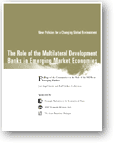Source: Carnegie
|
|
Report of the Commission on the Role of the MDBs in the EMEs |
|
| Commission Cochairs: José Angel Gurria and Paul Volcker | ||
| Pub Date: April 26, 2001 | ||
Full Text (PDF format)
Commission Members (PDF format)
Transcript of the Press Conference, April 26
Transcript of the report luncheon with Paul Volcker, May 1
Does lending by the World Bank and the regional development banks to emerging markets still make sense? Skeptics argue that the banks are no longer relevant for countries with access to private capital. To examine this issue, the Carnegie Endowment for International Peace, EMP Financial Advisors, LLC, and the Inter-American Dialogue formed a commission, cochaired by former Mexican Finance Minister José Angel Gurria and former U.S. Federal reserve Chairman Paul Volcker, to assess the activities of the multilateral development banks (MDBs) in the emerging market economies.
The Commission addressed two central questions: Should the MDBs continue to lend to this group of countries or instead concentrate attention on poorer countries with little access to private capital? What purposes should this lending serve and under what conditions should it take place?
The report argues that the MDBs should continue to lend to the emerging market economies as an integral part of their ongoing role in the years ahead. At the same time, Commission members recommend changes on long-standing MDB approaches toward the emerging market economies more appropriate to today's global economy.

